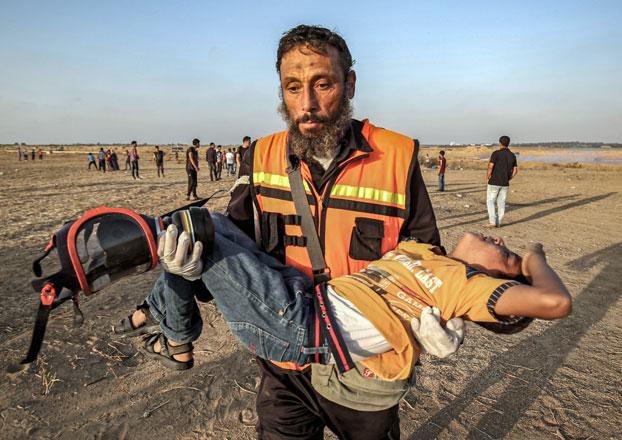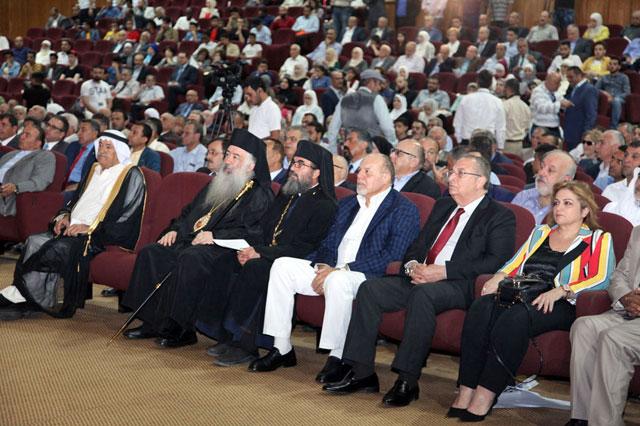You are here
No, Trump does not call Mideast plan ‘deal of the century’
By AFP - Jun 22,2019 - Last updated at Jun 22,2019

A Palestinian paramedic carries away an injured child during a demonstration along the border with Israel, east of Khan Yunis in the southern Gaza strip, on Friday (AFP photo)
RAMALLAH, Palestinian Territories — It has become common in recent months for media reports to say Donald Trump calls his proposed Palestinian-Israeli peace plan the “deal of the century”, a phrase seen as indicative of Trump’s real estate style of diplomacy.
Major international media, including AFP, have said the name was given by the president, but in fact it appears there is no record of him using it in public.
It seems the first major usage of the phrase originates from a 2017 meeting between Trump and Egyptian President Abdel Fattah Sisi.
Since then it has been used widely in the Arab world and by Palestinian President Mahmoud Abbas, particularly by those opposed to the deal.
The origins
Shortly after his surprise election victory in November 2016, president-elect Trump gave an interview to The Wall Street Journal.
Labelling it the “war that never ends,” he called achieving Palestinian-Israeli peace “the ultimate deal”.
“As a dealmaker, I’d like to do... the deal that can’t be made. And do it for humanity’s sake,” he said.
Trump had declared his desire to lead the most pro-Israel US government in history, but the Palestinians, Egyptians and other Arab states engaged with his administration on a potential peace proposal.
On April 3, 2017, Trump met President Sisi.
In Arabic-language remarks, the Egyptian leader told Trump he was fully supportive of Trump’s attempts to find a “solution to the issue of the century with the deal of the century”.
The simultaneous translation of his speech into English, however, translated Sisi’s statement as finding a solution to the “problem of the century”, with no reference to the word deal.
After the meeting the term deal of the century began to be discussed in Arabic media and online.
In May 2017, Palestinian leader Abbas met Trump at the White House but refers only to a “historic peace deal” without using the phrase deal of the century.
In September the two men met again and Abbas referred to it in Arabic as the “deal of the era”.
The simultaneous translation into English and White House transcript, however, referred to it as the “deal of the century”.
This is possibly the first time Trump heard the phrase in public.
In November 2017, the official Palestinian news agency labels it the ‘Deal of the century.’
In December, Abbas cut ties with the Trump administration after the US officially recognised occupied Jerusalem as Israel’s capital.
The phrase “Deal of the century” became commonly used by Palestinian officials attacking Trump’s proposals, shorthand criticism for the way Trump — a real estate mogul — thinks about foreign policy.
Over time it became the default Arabic phrase for the peace proposals.
It also starts to seep into English-language reporting on the issue.
In January 2019 The Wall Street Journal said Trump had “spoken repeatedly about his desire to find the ‘deal of the century’ to resolve the Palestinian-Israeli conflict”, while the Reuters news wire referred to a “diplomatic effort that Trump has touted as the ‘deal of the century’.”
In May, The New York Times said Trump and his son-in-law Jared Kushner were finally ready to unveil the first part of “what the president has called ‘the deal of the century’.”
On June 1, an AFP story said the plan had been “dubbed by Trump as the ‘deal of the century’.”
Yet, there is no record of the president or any of his senior officials working on the issue publicly using the phrase.
US officials have expressed surprise and confusion about how the formula became so commonplace.
In a statement to AFP, Trump’s Middle East envoy Jason Greenblatt distanced the administration from it.
“It’s not a label we prefer to use. It has been used in a derogatory way by some media outlets and others [outside the media],” he said.
“We will present a realistic and implementable vision for peace.”
Related Articles
AMMAN — Participants in a gathering that was held on Friday in support of Palestine and Jerusalem expressed their rejection of the US’ yet-t
GAZA CITY, Palestine — Hamas chief Ismail Haniyeh on Tuesday said US President Donald Trump’s recent decision to recognise Jerusalem as Isra
AMMAN — The head of the Lower House Palestine Committee, MP Yahya Saud, on Tuesday hailed His Majesty King Abdullah’s stance towards t

















